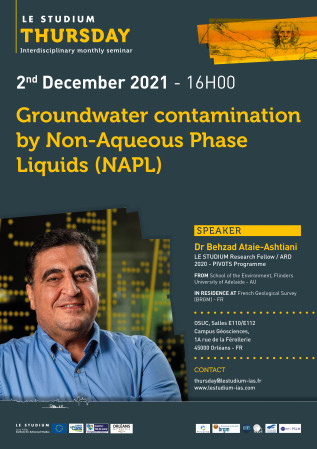Groundwater contamination by Non-Aqueous Phase Liquids (NAPL)
December 02, 2021 -
16 h 00
Thursday
OSUC, Salles E110/E112
Campus Géosciences
1A rue de la Férollerie
45000 ORLEANS
France
Presentation
Groundwater is a significant global resource, comprising 96% of the Earth's unfrozen freshwater. Groundwater resources are estimated to provide 36% of potable water, 42% of water for irrigation, and 24% of direct industrial water supply globally. About 75% of Europe depends on GW for water supply. Non-Aqueous Phase Liquids (NAPLs) are soil and groundwater contaminations, which remain undissolved or hardly dissolved in water. Physically and chemically, dissimilar fluids form interfaces among liquids and gas that prevent fluid mixing, and thus fluid flow in porous media is conceptualized as immiscible. Organic liquid contaminants such as petroleum oil, gasoline, or diesel fuel are frequent NAPL contaminations. Investigating, evaluating, and remediating the sites contaminated by NAPL is a challenging task. Exposure to even a small amount of pollution causes health and ecological risks to the environment. NAPLs are common soil and groundwater contamination in industrial countries. Remediation of contaminated sites by NAPLs is difficult and expensive, as NAPs are a long-term source of vapor, groundwater, and soil contamination in the subsurface zone.
The talk aims at the audience, who are not necessarily familiar with the topic at a technical level. The talk covers various points, including the importance of groundwater resources, the history of groundwater usage and a millennium-old hydrogeology textbook, and finally groundwater contamination by non-aqueous phase liquids and the numerical modeling of multiphase flow in the subsurface.
Admission on presentation of the health pass.
Speaker
LE STUDIUM Research Fellow / ARD 2020 - PIVOTS Programme
FROM: School of the Environment, Flinders University of Adelaide - AU
IN RESIDENCE AT: French Geological Survey (BRGM) - FR










